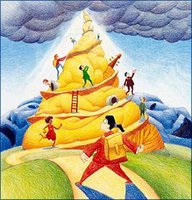 When I was a student, I always heard of the word 'utopia'. The word fascinates me and I wonder if it's achievable. After all, 'utopia' means 'ideally perfect place'.
When I was a student, I always heard of the word 'utopia'. The word fascinates me and I wonder if it's achievable. After all, 'utopia' means 'ideally perfect place'.Lately, I've been thinking about 'utopian schools' and how we can have it to apply to Asian educational environment. Hardly anyone talks about educational utopias anymore. Instead we all seem to be too caught up with exam results, school violence, teachers burnout and so-called excellence.
I've read an article saying that the early 1970s gave rise to exciting books like George Leonard's Education and Ecstasy and John Mann's Learning to Be, which painted fantasy pictures of futuristic schools that educated the total spectrum of human capability.
In Leonard's book, children used computer-assisted technology to interact with humanity's rich collection of symbol systems. Mann's book described a utopian school where children attended "empathy classes" and simulated trips to Mars. Just 30 years later, some of these fantasies seem laughably outdated, whereas others are just now being realized. In their time, however, these books revealed a freshness of vision and an unabashed impulse to explore the heights of possibility in education. We just don't seem to do much exploring in this hardheaded era.
I've checked the UM Main Library and it seems that both books are printed in the 1960s and 1970s. I'm going to get hold of those books later.
In 1983, we saw the development of the remarkable theory of multiple intelligences (MI) by Dr Howard Gardner which sets a new paradigm for educational utopia. Most of us know what multiple intelligences are. In Malaysia, we have kindergartens and even publishers who tried to market their products and services by exploiting Gardner's model without fully understand its structure.
I love the idea of educational utopia. I wish that someday our ministry of education will be interested as well.

